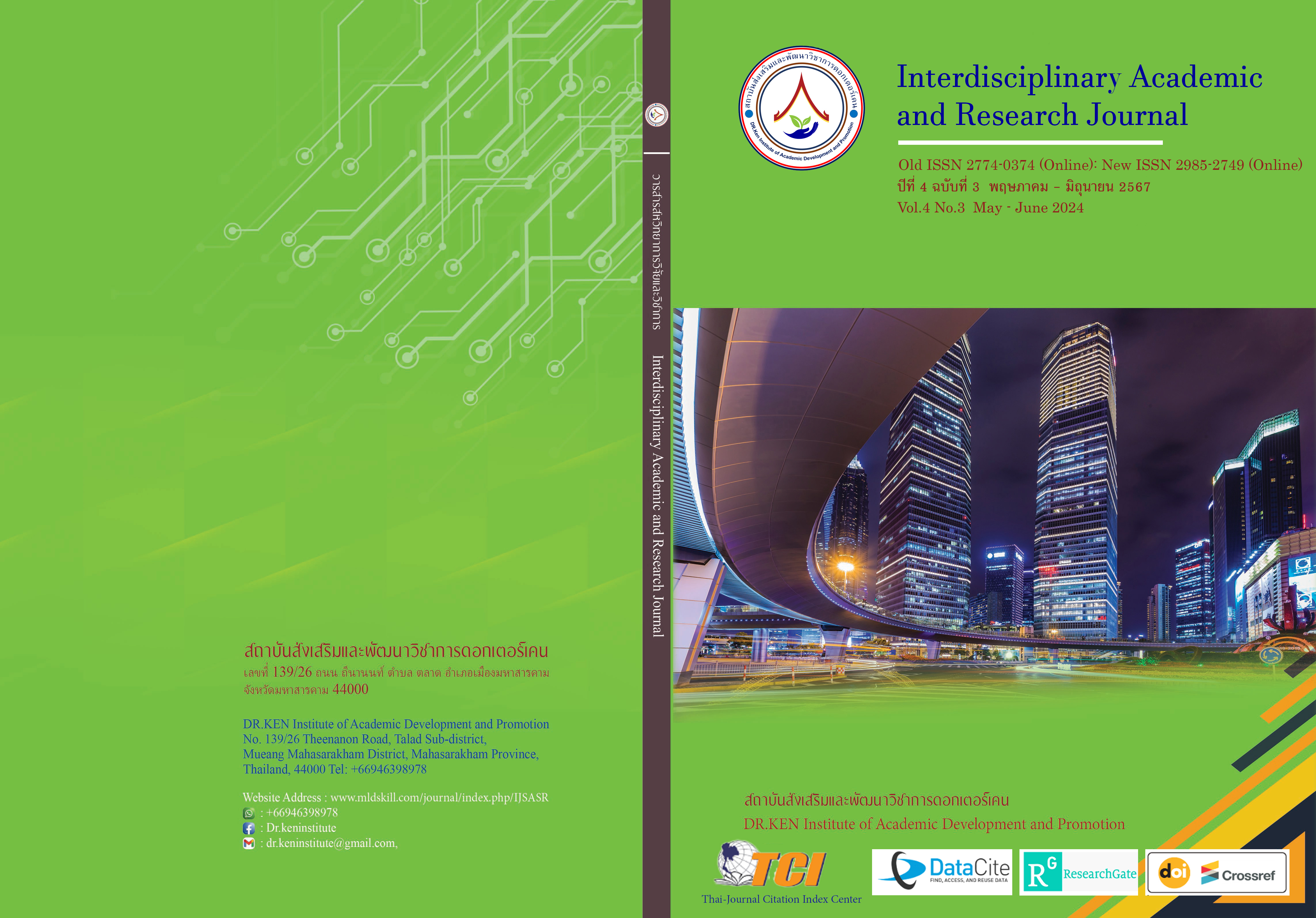Developing Scientific Competency of Learners in Evaluating and Designing of Scientific Enquiry Processes of Teaching Students
DOI:
https://doi.org/10.60027/iarj.2024.276543Keywords:
Scientific Competencies; , Evaluating and Designing Scientific Inquiry Processes; , Teaching Professional StudentsAbstract
Background and Aims: Developing scientific competencies in process evaluation and design search Acquire scientific knowledge of students of the teaching profession. This research aims to improve the scientific competency in the assessment and design of scientific inquiry processes of teacher professional experience trainees.
Methodology: The subjects were students practicing teacher professional experience. Currently studying in Year 5, Semester 2, Academic Year 2022 General Science, Faculty of Education, Chaiyaphum Rajabhat University who practice teaching in junior high schools. In Chaiyaphum province, 30 people. It is obtained by selecting specific samples. (Purposive sampling ) The characteristics of the selected sample are following the purpose of the research. The tools used in this study include 1) an Assessment of the learning management plan of teacher professional experience students, and 2) a Scientific competency assessment form for the evaluation and design of the inquiry process. The statistics used in this study include mean and standard deviation.
Results: The teacher professional experience trainees had a high level of scientific competence in assessing and designing scientific inquiry processes.
Conclusion: Developing scientific competencies in process evaluation and design Investigate the scientific knowledge of students of the teaching profession. make Teacher professional experience students have a high level of scientific competence in assessing and designing scientific inquiry processes. Therefore, it should be encouraged and encouraged to Lead the development of scientific competencies in process evaluation and design. This scientific knowledge is used in undergraduate teaching and learning in sciences related to science education.
References
จารุนันท์ พาภักดี. (2563). การพัฒนาสมรรถนะการแปลความหมายข้อมูลและประจักษ์พยานในเชิงวิทยาศาสตร์ ของนักเรียนชั้นมัธยมศึกษาปีที่ 5 ที่ได้รับการจัดการเรียนรู้แบบสืบเสาะที่ขับเคลื่อนด้วยกลวิธีการโต้แย้ง. วิทยานิพนธ์การศึกษามหาบัณฑิต สาขาวิชาการสอนวิทยาศาสตร์และคณิตศาสตร์: มหาวิทยาลัยมหาสารคาม.
ประสาท เนืองเฉลิม. (2560). ทักษะการเรียนรู้ของครูวิทยาศาสตร์ในศตวรรษที่ 21. วารสารมนุษยศาสตร์และสังคมศาสตร์ มหาวิทยาลัยมหาสารคาม. 36(4), 109–116.
มนตรี จันตะมะ. (2562). การจัดการเรียนรู้โดยใช้วิจัยเป็นฐานที่ส่งเสริมสมรรถนะการประเมินและออกแบบกระบวนการสืบเสาะหาความรู้ทางวิทยาศาสตร์และทักษะการทำงานร่วมกันเป็นทีม เรื่อง การสืบพันธุ์ และการเจริญเติบโตของพืชดอก สำหรับนักเรียนชั้นมัธยมศึกษาปีที่ 5. วิทยานิพนธ์การศึกษามหาบัณฑิต สาขาวิชาวิทยาศาสตร์ศึกษา: มหาวิทยาลัยนเรศวร พิษณุโลก.
รัตนะ บัวสนธ์. (2552). วิจัยเชิงคุณภาพทางการศึกษา. กรุงเทพมหานคร : จุฬาลงกรณ์มหาวิทยาลัย.
สถาบันทดสอบทางการศึกษาแห่งชาติ (สทศ). (2565). ผลสอบ O-NET. กรุงเทพฯ: สถาบันทดสอบทางการศึกษาแห่งชาติ (องค์การมหาชน).
สถาบันส่งเสริมการสอนวิทยาศาสตร์และเทคโนโลยี (สสวท.). (2564). เอกสารประกอบการอบรม การจัดการเรียนรู้ฐานสมรรถนะทางวิทยาศาสตร์ โครงการเพิ่มศักยภาพครูให้มีสมรรถนะของครูยุคใหม่ สำหรับการเรียนรู้ศตวรรษที่ 21. กรุงเทพฯ: สถาบันส่งเสริมการสอนวิทยาศาสตร์และเทคโนโลยี.
สถาพร ปิ่นทอง, ณรงค์ พิมสาร, และเสวียน เจนเขว้า. (2565). แนวทางการพัฒนาสมรรถนะการจัดการเรียนรู้ของครูวิทยาศาสตร์ระดับมัธยมศึกษา สังกัดสำนักงานคณะกรรมการส่งเสริมการศึกษาเอกชนในกรุงเทพมหานคร. การประชุมหาดใหญ่วิชาการระดับชาติและนานาชาติครั้งที่ 13, 12 พฤษภาคม 2565, สงขลา : มหาวิทยาลัยหาดใหญ่, ประเทศไทย.
Holbrook, J., & Rannikmae, M. (2009). The Meaning of Scientific Literacy. International Journal of Environmental & Science Education, 4(3), 275–288.
Organization for Economic Co-operation and Development (OECD). (2006). Assessing Scientific Reading and Mathematics Literacy: A Framework For PISA 2006. Paris: OECD publications.
Organization for Economic Co-operation and Development (OECD). (2013). Education at a Glance 2013. OECD Indicators: OECD Publishing.
Downloads
Published
How to Cite
Issue
Section
License
Copyright (c) 2024 Interdisciplinary Academic and Research Journal

This work is licensed under a Creative Commons Attribution-NonCommercial-NoDerivatives 4.0 International License.
Copyright on any article in the Interdisciplinary Academic and Research Journal is retained by the author(s) under the under the Creative Commons Attribution-NonCommercial-NoDerivatives 4.0 International License. Permission to use text, content, images, etc. of publication. Any user to read, download, copy, distribute, print, search, or link to the full texts of articles, crawl them for indexing, pass them as data to software, or use them for any other lawful purpose. But do not use it for commercial use or with the intent to benefit any business.
















.png)


